|
|
|
Sort Order |
|
|
|
Items / Page
|
|
|
|
|
|
|
| Srl | Item |
| 1 |
ID:
103247
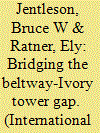

|
|
|
|
|
| Publication |
2011.
|
| Summary/Abstract |
While some gap between the academic and policy worlds is inherent, it is neither necessary nor beneficial for the "Beltway-Ivory Tower" to be as wide as it is. Three principal factors explain the extent of the gap: academia's dominant organizational culture, which devalues policy relevance; increased role of think tanks as research transmission belts to the policy world; and limited interest of the policy community in academic research. The case for the value of greater policy relevance for the international relations scholarly community is based on the intellectual pluralism of bringing policy relevance in while not driving theory out, intellectual complementarity in the different relative strengths of scholars and policy professionals, and self-interest both in what individual scholars can learn and in being true to the mission of universities. We make three principal bridging the gap recommendations: increase disciplinary incentives for policy relevant scholarship, more programmatic and project-based connectivity, and more policy world experiential opportunities.
|
|
|
|
|
|
|
|
|
|
|
|
|
|
|
|
| 2 |
ID:
103252


|
|
|
|
|
| Publication |
2011.
|
| Summary/Abstract |
This article explores the different approaches to study of conflict resolution from a variety of interdisciplinary perspectives. It argues that CR research is sophisticated and nuanced, addressing both state-level and group-level motivations behind political violence. The article argues that there are two distinct strands within CR scholarship: one that deals with "conflict transformation;" the other which deals with "conflict settlement." Although these two strands are sometimes seen as offering conflicting interpretations of conflict, we are argue that they are essentially complementary and have much to offer theoretically and practically to policymakers.
|
|
|
|
|
|
|
|
|
|
|
|
|
|
|
|
| 3 |
ID:
103248


|
|
|
|
|
| Publication |
2011.
|
| Summary/Abstract |
While an interactive relationship between scholars and policymakers is generally regarded as mutually beneficial, there is also the risk of 'entrapment.' The latter occurs when scholars, once having proven their usefulness to policymakers and thereby earned their trust, become unwilling to offer dissenting opinions for the fear of risking their access and privileges. Using Asian regionalism as an example, this article argues that the development of regional institutions in Asia has benefitted from the ideas and input of the two main channels of such scholar-official interaction: epistemic communities and track two dialogues, especially during the formative stages of Asian regionalism (both economic and security). But after gaining access, scholars engaged with officialdom in developing regional institutions have found it difficult to dissent from the official line, and in challenging the shortcomings and failures of Asian regional institutions. In Asia, the danger of entrapment has been strong in authoritarian countries. In general, participation by Asian scholars in the policymaking process has suffered from the inability of scholars and think-tankers (especially the latter) to rise above the national interest and question the official position of their own governments, the ubiquitous presence and dominance of government-linked scholars or retired government officials in track two dialogues, the exclusion of social movements form many such dialogues, the presence and influence of non-specialists (in issue areas) in setting their agenda and outcome, and generational gatekeeping (failure to bring in new faces). As a result, the development of a genuine transnational regionalism has been stunted.
|
|
|
|
|
|
|
|
|
|
|
|
|
|
|
|
| 4 |
ID:
103257
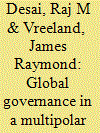

|
|
|
|
|
| Publication |
2011.
|
| Summary/Abstract |
The reform of global financial governance is long overdue. Recent changes to the governance of the International Monetary Fund partially address the lack of representation of emerging market countries, but not their loss of confidence in the institution. In the meantime, alternative and perhaps better approaches to the problems of open economics are being proposed at a regional level. We describe these regional monetary funds and discuss their prospects. We conclude that because economic interdependence is strongest at the regional level, regional cooperation seems well-suited to a multipolar world.
|
|
|
|
|
|
|
|
|
|
|
|
|
|
|
|
| 5 |
ID:
103255


|
|
|
| 6 |
ID:
103254
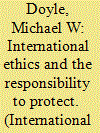

|
|
|
|
|
| Publication |
2011.
|
| Summary/Abstract |
I examine the roots of "Responsibility to Protect" in international ethics. International responsibility to protect is as a whole at odds with international law, but deeply familiar to Liberal international ethics. But, controversially, I argue that even the Realist and Marxist traditions include commitments to human respect that make humanitarian concerns far from foreign. I then explore how it evolved out of the crisis in Kosovo and the question of its policy significance today in cases in which it has been invoked, ranging from Myanmar to Kenya and Guinea - sometimes explicitly, sometimes implicitly, successfully and not. My conclusion is that R2P has contributed to the increasing pluralism, contested and contestable, of the normative architecture of world politics, and thus has produced confusion. But, this confusion may reduce as RtoP norms are accumulated in customary law and reshape the discourse of international ethics. In any case, where the alternative to pluralism is clarity that either abandons vulnerable populations or imposes unrealistic expectations of enforced human rights, confusion is a step forward, a resource for responsible policy and the best we are likely to get if we continue to care about both vulnerable populations and national sovereignty.
|
|
|
|
|
|
|
|
|
|
|
|
|
|
|
|
| 7 |
ID:
103249


|
|
|
|
|
| Publication |
2011.
|
| Summary/Abstract |
In the case of the United Nations, scholars have had an impact in fostering ideas and policies, including human development, climate change, global compact, sovereignty as responsibility, and human security. Of the three-headed UN monster-the first UN of member states, the second UN of staff members, scholars constitute a key part of the third UN of those closely associated with the world body but independent from it. Scholars' roles include research, policy analysis, and idea mongering. They have been able to exert influence as consultants, commissioners, and temporary staffs.
|
|
|
|
|
|
|
|
|
|
|
|
|
|
|
|
| 8 |
ID:
103251


|
|
|
|
|
| Publication |
2011.
|
| Summary/Abstract |
The nuclear arms control regime-centered on the 1968 Nuclear Nonproliferation Treaty (NPT)-faces five challenges: failure of nuclear disarmament by the five NPT-licit nuclear powers (China, France, Russia, the United Kingdom and the United States); possible cheating by non-nuclear signatories like North Korea and Iran; India, Israel, and Pakistan remaining outside the NPT; terrorists' interest in acquiring and using nuclear weapons; and the safety, security and proliferation risks of the increased interest in nuclear energy to offset the financial and environmental costs of fossil fuel.
|
|
|
|
|
|
|
|
|
|
|
|
|
|
|
|
| 9 |
ID:
103253
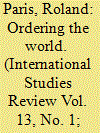

|
|
|
|
|
| Publication |
2011.
|
| Summary/Abstract |
The gap between academic research and policymaking in international relations (IR) is much lamented but poorly understood. Much of what we know about the gap is based on personal anecdotes, untested assumptions, and simplistic conceptions of what counts as policy influence. Using the literature on fragile states as a window into the research-policy interface, this article finds little evidence of scholarship directly influencing policies through specific recommendations and findings. However, academic ideas in this field appear to have important indirect effects on international policy actors - namely, by helping to define and refine understandings of state fragility as a policy problem and by informing the development of operational frameworks for responding to this problem - even though the actors themselves may not be entirely aware of such conceptual influences.
|
|
|
|
|
|
|
|
|
|
|
|
|
|
|
|
| 10 |
ID:
103250


|
|
|
|
|
| Publication |
2011.
|
| Summary/Abstract |
International Relations (IR) scholarship is directly in the path of two simultaneous tidal waves. The first is the rise of China and India in the traditional IR terms of military and economic power. The second is the expanding nature of what IR scholarship needs to address, as global integration transforms the nature of the issues to be addressed and numerous trends expand the number and types of relevant actors. Neither theory nor practice is yet coping well with the profound implications of these fundamental changes. Investigating what kind of a world order might emerge from these two simultaneous tsunamis will require an enormous research agenda that explores the roles of ideas, structural factors, and path dependencies across regions and issue areas. This article aims to illuminate a subset focused around the connection between theory and practice as related to two emerging powers. It briefly maps developments in Western IR theory and explores how those connect-or fail to connect-with intellectual and policy currents in the rising Asian giants. It draws on a number of interviews and workshops held in Asia in the past two years that explore how Asian scholars and policymakers are dealing with, and perhaps beginning to shape, the rapidly changing conceptual landscape.
|
|
|
|
|
|
|
|
|
|
|
|
|
|
|
|
| 11 |
ID:
103256


|
|
|
|
|
| Publication |
2011.
|
| Summary/Abstract |
This essay reviews the literature and origins of the targeted sanctions framework. The development of smart sanctions has solved many of the political problems that prior efforts at comprehensive trade sanctions had created. In so doing, the idea of smart sanctions served as a useful focal point for policy coordination among key stakeholders. Nevertheless, there is no systematic evidence that smart sanctions will yield better policy results vis-à-vis the targeted country. Indeed, in many ways, the smart sanctions framework has been too successful. It would behoove policymakers and scholars to look beyond the targeted sanctions framework to examine the conditions under which different kinds of economic statecraft should be deployed.
|
|
|
|
|
|
|
|
|
|
|
|
|
|
|
|
| 12 |
ID:
103259
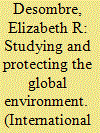

|
|
|
|
|
| Publication |
2011.
|
| Summary/Abstract |
There are few issue areas within international relations in which the policy realm has followed the scholarship quite as quickly or as far as in the area of the environment. After simple identification of the existence and causes of existing environmental problems, both scholarship and policy initially focused on formal institutional approaches for addressing these problems, and both have expanded that focus to include greater consideration of informal approaches, expansion of the environmental issues considered, and concentration on the importance of nonstate actors. Critical scholarship, the one area of scholarship with little connection to policy, calls attention to the interests, power structures, and assumptions that underlie environmental behavior and suggests that small-scale improvements over business-as-usual are misleading and even counterproductive. But most environmental politics scholarship has drawn direct influence from, and contributed to, policy pertaining to the environment. Ultimately, it is likely that both scholarship and policy have been strengthened by this close connection, but at the same time, both have perhaps been narrowed by it as well, so that some important issues or approaches have been understudied. While there are advantages to the close relationship in this subfield between scholarship and policy, there may be some advantages in the future to encouraging some distance between the two, even for those ultimately concerned about the fate of the global environment.
|
|
|
|
|
|
|
|
|
|
|
|
|
|
|
|
| 13 |
ID:
103258
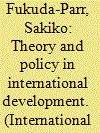

|
|
|
|
|
| Publication |
2011.
|
| Summary/Abstract |
Theory has influenced policy in international development but the interaction has been a two-way process. While theories legitimated new policy, appraisal of policy and experience have given rise to theoretical insights. But of the many competing ideas and theories, which ones influence policy? This article analyzes the influence of Sen's capability and human development approach on the recent evolution of policy agendas in international development, notably the consensus on MDGs and on poverty as the priority concern. It argues that the capability approach played an important role in the contestations over structural adjustment and Washington Consensus policies that led to the new consensus over the MDGs, and help legitimate them, the neoliberal policy approaches of the Washington Consensus remain intact. This illustrates an important distinction between normative and causative ideas. The new consensus has adopted the normative ideas of the capability approach but not the causative ideas. These normative ideas were used to provide a new narrative for international development, not a new policy framework.
|
|
|
|
|
|
|
|
|
|
|
|
|
|
|
|
| 14 |
ID:
103260


|
|
|
|
|
| Publication |
2011.
|
| Summary/Abstract |
This article takes the example of global governance in order to reflect on the problematic relationship between theory and practice and on the gap that exists between the academic and policy worlds. That there is a gap between the two worlds is clear. Some insist on the benefits to be gained from trying to bridge the gap, highlighting the contribution that theoretical inquiry can make to the policy world and the responsibility of academics to contribute towards resolving policy challenges. Others argue for the continued importance of a division of labour, stressing that the logic of theoretical enquiry demands analytical and critical distance from power and politics. This article does not examine either of these extreme positions but instead explores the dangers of the middle road. For academics, insufficient awareness of the problematic ways in which theory and practice are inextricably interwoven makes it more likely that they will fall hostage to the politics and parochial prejudices of both time and place. For policymakers and for those who teach public policy, the danger lies in seeking the authority and legitimacy of academic work that purportedly embodies objectivity and detachment but that in fact merely translates the prejudices and preoccupations of the policy world back into a different idiom. An unreflective and uncritical attitude to the relationship between theory and practice can leave the academic study of International Relations in the worst of all possible worlds.
|
|
|
|
|
|
|
|
|
|
|
|
|
|
|
|
| 15 |
ID:
103246
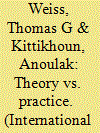

|
|
|
|
|
| Publication |
2011.
|
| Summary/Abstract |
This special presidential issue addresses the theory-practice question across major institutions and global challenges. First, what is the influence of scholars on institutions? What accounts for influence or the lack thereof? What type of future engagement should exist for scholars on these institutions? Second, what are acceptable theoretical approaches to a given global challenge? What are the existing policies and practices, and do they coincide with dominant scholarly approaches? What relationship would be most useful between theory and practice on any issue? The 51st International Studies Association Annual Convention and these pages explore the impacts of scholars on policymaking and institutions as well as the limitations of theory in responding to global challenges. Stereotypes obfuscate the complex reality that scholarship matters.
|
|
|
|
|
|
|
|
|
|
|
|
|
|
|
|
|
|
|
|
|